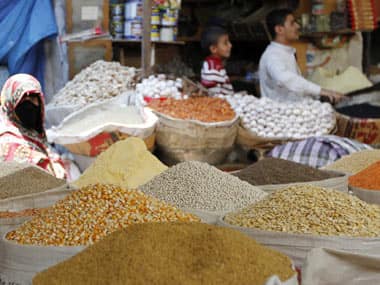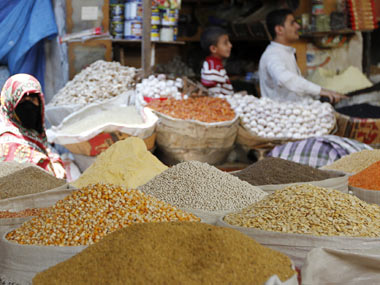Before we hit the keyboard to criticise the UPA government’s Food Security Ordinance and the Amartya Sen-led ideas behind it, it would be worthwhile to introspect what exactly we are chewing. Behind arguments against the law, lie privileged and powerful voices. So loud are these voices that they drown every other sound, including cold logic that stares them in the face. Feasting on an intellectual gluttony, they chew heavy subsidies in the name of the poor, while ensuring the poor stay where they are.
This is not to justify the ordinance. Of course, it is a political purchase of votes by the Congress-led United Progressive Alliance - but why else would you be in the business of power? The law would increase India’s fiscal deficit, no doubt. In turn, that could bring India on the edge of a negative rating. Which, finally, would accelerate the exit of global investors, peeved with extreme misgovernance, on one side, and policy uncertainty, on the other. But investors are exiting anyway - the case of Posco and ArcelorMittal that quit projects worth Rs 80,000 crore last week is the pinnacle of this malaise. Putting food in the mouths of India’s poor will make things worse, goes the argument.
Except, when you pull it out of its isolation and put it in a wider context. The next time we criticise Sen for being the intellectual spine of UPA’s misguided socialistic dalliances, particularly in the context of food security, we need to spare a strenuous minute thinking about six large subsidies that we chew on. Then place the numbers next to each other. Finally, see who’s getting what subsidy and decide that subsidies are here to stay, should they be going to the poor or the wealthy. “The unequal power of the relatively privileged is a huge source of distortion of India’s equitable development priorities,” write Sen and Jean Dreze in their recently-released and must-read book, An Uncertain Glory.
[caption id=“attachment_978889” align=“alignright” width=“380”]  Reuters[/caption]
Fuel. SUVs are fun to drive. You glide over traffic rather than be part of it, as the global leaders of one of the high-end SUVs told me in the last Auto Expo. A large part of the cost of this diesel-driven gliding is borne by the exchequer, with the subsidy being Rs 29,000 crore. Of course, SUVs are a small percentage of total cars sold, the domain of the wealthy. But even those of us with relatively modest means and who drive petrol cars and benefit from diesel-fuelled air-conditioning at shopping malls, can’t wish the moral burden away. “In the case of diesel, it is evident that the subsidy given in the name of poor has been benefiting diesel car owners, telecom towers, diesel generators and others who do not merit a subsidy,” a study by Integrated Research and Action for Development showed. Or look at the hue and cry raised by us, when the government proposed to limited the subsided LPG gas cylinders to six.
Gold and jewellery. While I personally don’t think much of precious metals and stones, it seems the subsidy culture does. In what Sen and Dreze describe as “implicit subsidies”, the revenue foregone by the government on ‘diamond and gold’ stands at Rs 66,000 crore, or 20 percent of all revenue foregone. Among commodities, this implicit subsidy is more than even crude oil and mineral oils. So, we want our gold to be subsidised - even if it causes the current account deficit to shoot up - but not the food for poor.
[embedalsosee]
Tax. As taxpayers, all of us are familiar with an animal called 80C, which is the tax deduction we get if we invest in certain products like mutual funds and insurance policies. All told, that revenue forgone adds up to more than Rs 30,000 crore. Add all the other implicit subsidies like health insurance or interest on loans taken for higher education, and the figure rises to almost Rs 37,000 crore. A subsidy for those earning Rs 20 lakh a year but none for those living on less than $2 a day.
Power. Bemoan the power shortage in India? Well, as consumers of electricity, we’re to blame. The last time power prices were being raised, the spoilt city of New Delhi was aghast. How can power bills rise? “Subventions from state budgets to cover losses of state electricity boards have exceeded 10 percent of the state gross fiscal deficit,” wrote Pranab Bardhan in Awakening Giants. A large part of these losses come because power is diverted to large farmers, who protect those subsides at the cost of shortages in the country. Last month, for instance, the Rajasthan government announced a Rs 5,774 crore subsidy to power companies, so they can deliver cheaper power to “farmers and small domestic consumers”. In Tamil Nadu, power subsidies, at Rs 5,200 crore (up Rs 1,000 crore from previous year), top budgetary allocations. Even now, as we debate gas pricing that has been doubled to $8.4 a unit, the government is sending signals that the price of gas could be lower for power plants. If that’s not a subsidy, what is?
Fertilisers. As much as Rs 70,000 crore, or 0.8 per cent of GDP, is lost to the exchequer in the name of fertiliser subsidy for poor farmers. Most of this money, however, goes into the coffers of fertiliser companies and wealthy farmers. Try and sell the idea of giving cash subsidies to poor farmers so they can buy the fertiliser they need, and see the outrage from the fertiliser lobby. As if the subsidy wasn’t enough, the revenue foregone on fertilisers stands at Rs 8,000 crore. Again, the price of gas, as in the case of power above, would be lower for fertiliser companies. We need to ask, who we are subsiding here: poor farmers or wealthy investors?
Invisibles. There are other subsides that we enjoy. How many of us paid market rates to get our degrees and doctorates? Even today, a four-year degree at some of the best colleges in the most sought after Delhi University costs Rs 1 lakh, when many of those enjoying this subsidy pay double of that for one year in a decent school. And when we don’t get 99 percent to get that admission, we go abroad, pay Rs 1 crore for our degrees - and get the government to forgo revenue of Rs 316 crore (deduction on account of interest on loan taken for higher education, under Section 80E). I plead guilty of enjoying a free ride throughout my college days - a subsidised “all-route pass” given to us by DTC (Delhi Transport Corporation) allowed us to travel on any bus going anywhere for Rs 12.50 a month.
Numbers are still being debated, but the Parliamentary Standing Committee says the cost of food security would be about Rs 112,000 crore. Of this, Rs 90,000 crore is already in existence, so the current fight is around Rs 22,000 crore. Now, compare the numbers above and do an audit of all subsidies, across the board. I believe, when you put the numbers next to each other, Sen’s contextual support for food security will fall into place. Once we realign subsidies and put them in terms of what the state ought to subsidise first - put food in the mouths of the poor or gold in the hands of the rich - criticism against food security will reduce. In an ideal world, there should be no subsidies, but if we must have them, food is more important than gold, investments or electricity. It’s time to end the intellectual gluttony around subsidies.


)
)
)
)
)
)
)
)
)



